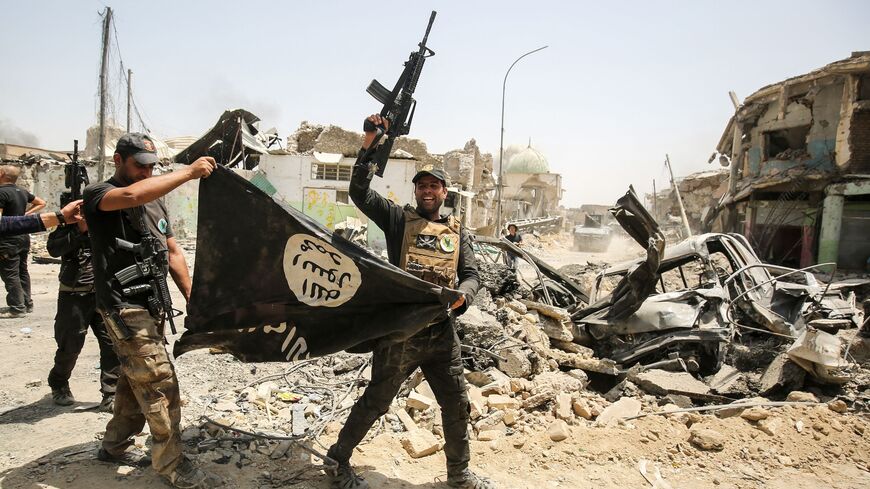
On May 13, Iraqi media reported a brutal attack by the notorious Islamic State (ISIS) on a military outpost in eastern Diyala and Salahuddin provinces.
Iraqi authorities did not provide specific details of the deadly incident apart from saying that the attackers killed a commanding officer and four Iraqi soldiers and wounded others. Iraqi forces launched an operation in the al-Aith area of Salahuddin in retaliation.
That the May 13 attack was perpetrated by Islamic State militants suggests that rural areas remain a hotbed of activity for militant cells despite an earlier declaration of victory over ISIS in Iraq and Syria by a U.S.-led international anti-terrorist coalition in 2017. Other regional threats, including sectarian and proxy wars, appear to have undermined the Iraqi government’s counter-ISIS efforts and facilitated the radical organization’s revival.
Since 2017, Iraqi forces have evolved and appear more capable of confronting the group, even if they did not have sufficient intelligence to prevent the latest attack. Iraq has been hampered by the U.S. partial withdrawal of forces in 2021, which has created a vacuum in the central and northern areas of the country. Syria also remains a fertile ground for ISIS militants and their affiliates to regain a foothold by launching attacks against forces loyal to Syrian President Bashar al-Assad.
According to U.S. Central Command data released in January 2024, ISIS has about 2,500 fighters in Iraq and Syria of whom about 1,000 are at large in Iraq. A non-profit group called the Counter Extremism Project reports at least 69 confirmed ISIS attacks in central Syria in just one month — March 2024.
ISIS is also regaining a footprint in Africa and South Asia, especially in Afghanistan and Pakistan through affiliates such as Islamic State West Africa Province (IS-WA), Sahel Province (IS-SP), and Islamic State Khorasan Province (ISIS-K). ISIS-K has carried a number of violent terror attacks in Iran, Afghanistan, Turkey, and Russia this year, including a March 22 attack that killed more than 140 people at a concert hall in Moscow.
In the case of Iraq, ISIS and its affiliates may have difficulty re-establishing control over large swathes of territory. The Iraqi military still maintains military-technical superiority over the group and conducted several counter-terrorist operations in March 2024 that resulted in the death of a prominent ISIS leader, Samir Khader Sharif Shihan al-Nimrawi. Nimrawi was responsible for the transfer of fighters, weapons, and explosives between Iraq and Syria.
Regional power dynamics have undergone a significant shift since ISIS arose from the remnants of al-Qaeda in Iraq and established a “caliphate” in Syria and northern Iraq in 2014. The nationwide sectarian polarization that resulted from the U.S. invasion of Iraq in 2003 and the marginalization of the once-ruling Sunnis has eased as the Iraqi government managed to address some Sunni concerns and undermine attempts by radical Sunni organizations to return to power. However, should the U.S. withdraw its remaining 2,500 troops from Iraq — a key priority of Prime Minister Mohammad Al-Sudani’s government – that could enable ISIS to widen the scope of its activities.
In addition to the U.S. presence, current geopolitical turmoil in the region stemming from the ongoing Israel–Hamas war has also undermined regional stability and incentivized the resurgence of radical Islamist organizations. Therefore, ISIS, despite its inability to reconquer large amounts of territory in Iraq, remains a real threat, particularly in poor rural areas that have yet to recover from the 2014-2017 anti-ISIS campaign.
At this stage, a worrying scenario for Iraq would be an ISIS comeback in Syria. The Assad regime controls at most 70 percent of Syria and a planned upcoming Turkish large-scale military operation in northern Syria against the Kurdistan Workers’ Party (PKK) could further destabilize the country.
Paradoxically, Kurdish militants in Syria, particularly the Syrian Democratic Forces (SDF), have been critical U.S. allies in the fight against ISIS. As a result, official Baghdad maintains a close dialogue with Ankara and Damascus to try to coordinate future cross-border military operations should ISIS militants try to carry out a major attack.
The piece was originally published by Stimson Center
